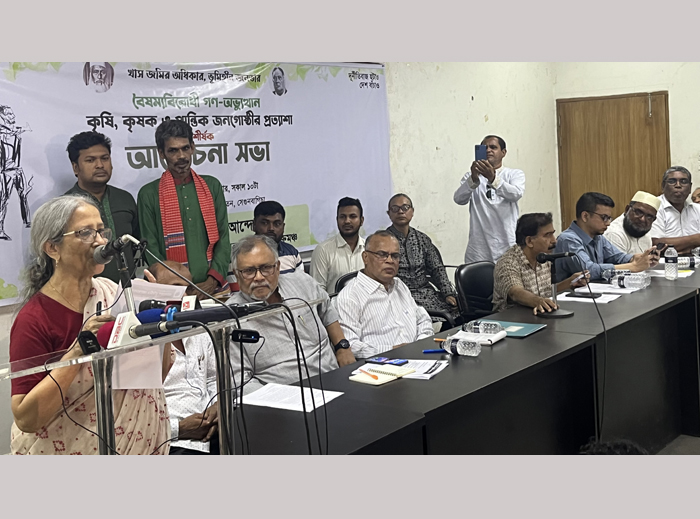
DHAKA, Oct 09, 2024 (BSS) - Fisheries and Livestock Ministry Adviser Farida Akhter today underscored the need for representation of landless people and marginal communities in the constitution reform committee.
“It is not expected that some people have an abundance of lands while some others don’t have land even to build a house despite the country having khas lands,” said Farida.
The adviser was addressing a discussion titled ‘Anti-Discrimination Mass Uprising – Expectations of Farmers and Marginalised Communities’ at Dhaka Reporters Unity (DRU) here today.
The adviser said if the constitution is reformed, representation of landless people must be there in the reform committee.
The adviser said if a rural woman gets the opportunity to raise a calf (baby cow) and a goat properly, she can manage to bear the education expenses of a child along with her regular expenses. Even if in the long run, it is possible that she can buy a land on her name too, she added.
Farida urged the landless people, farmers and the marginal people to keep raising voices for their rights saying, “That we are in the ministry doesn’t mean we went far away from you, rather we will be always with you. Do not think that the time of movement is over.”
“We got a new freedom through the sacrifices of lives of so many students and people…So, we have a lot of work to do,” she added.
The advisor called upon all concerned to minimize use of animal antibiotics for the safe food, Fisheries and Livestock, saying, “Antibiotics use must be restricted for animal for ensuring safe food supply as the human foods are closely related with the animals”.
All the foods whatever the people consume like vegetables, fruits, fish and meat are being contaminated with the effects of antibiotics, she said.
As a result, the human bodies become resistant to antibiotics, she said, adding, “When I went to visit the student-movement injured patients in the hospitals, doctors used to say that young people's bodies alarmingly become resistant to multiple antibiotics that makes the treatment complex”.
Bangladeshi photographer and rights activist Shahidul Alam said the mass upsurge will be meaningful, if the representation of landless and marginal people can be included in the decision making process of the state.
Urging the government to formulate a law to dismantle the syndicates in the agriculture and fisheries sectors, Associate Professor of Sher-e-Bangla Agricultural University Obaidul Islam said, “Our country’s farmers are being affected and suppressed by various syndicates.”
The farmers have to buy things many times higher prices than actual, he said, adding, “For example, the farmers have to buy the seeds with taka 500 which was actually produced by around 50 Taka”.
In the discussion, Bangladesh Landless Movement presented a nine-point proposal including forming an independent commission to solve the problems related to agriculture, farmers and landless people.
They also demanded to identify the Khas land properly and distribute it among the actual landless people on priority basis as well as holding housing and real estate companies accountable for unlawful land acquisition.
The proposal also added allocating water bodies to genuine farmers and fishers as well as bringing an end to illegal acquisition of fertile farmland in guise of development.
Bangladesh Landless Movement organized the event in collaboration with the Gonomukti Moncho (PLP) and the Rastro Songskar Andolon.
The discussion was also addressed by public administration ministry’s retired Additional Secretary Alim Akhter Khan, Chief Coordinator of Rastro Songskar Andolon Advocate Hasnat Quaiyum, ALRD Executive Director Shamsul Huda, Citizen’s Initiative Chief Executive Zakir Hossain, iFarmer CEO Fahad Ifaz and Data Scientist Tanzim Taher.
President of Bangladesh Landless Movement Saidul Rahman Lutfar and General Secretary of Bangladesh Landless Movement Sheikh Nasir Uddin also spoke on the occasion.